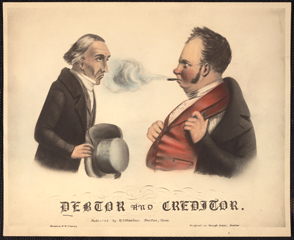Baker Library I Bloomberg Center Exhibit Examines the History of Personal Credit
 Photo: Baker Library Historical Collections
Photo: Baker Library Historical Collections
BOSTON—A new exhibit, "Buy Now, Pay Later: A History of Personal Credit," opened recently in the Baker Library | Bloomberg Center lobby on the Harvard Business School campus in Boston. The exhibit was organized by the Baker Library Historical Collections, part of the School's Knowledge and Library Services. The exhibit will run until June 3, 2011. "Buy Now, Pay Later" demonstrates that although the instruments and institutions of 21st century credit—the installment plan, the credit card, and the home finance industry—are less than a century old, credit itself is as old as commerce. The exhibition draws materials from Baker Library's extensive Historical Collections to show how previous generations devised creative ways of lending and borrowing. The exhibit depicts how the credit industry has evolved over time in several stages, including:
Among the materials on display in the exhibit, the records of colonial American merchants and storekeepers make clear the importance of credit in a society where hard cash was scarce. In the modern era, credit has become the business of major corporations and the subject of consumer protection regulation that seeks to expand access to credit as well as protect the borrower. "Buy Now, Pay Later" shows in vivid and interesting fashion how credit has moved from the fringes of the economy to its very center. The exhibit is open to the public Monday-Friday from 9:00 a.m.to 5:00 p.m. Visit the Baker Library Historical Collections Web site to learn more about the history of personal credit and to view some of the items featured in the exhibit. About Baker Library Historical Collections |
About Harvard Business School
Harvard Business School, located on a 40-acre campus in Boston, was founded in 1908 as part of Harvard University. It is among the world's most trusted sources of management education and thought leadership. For more than a century, the School's faculty has combined a passion for teaching with rigorous research conducted alongside practitioners at world-leading organizations to educate leaders who make a difference in the world. Through a dynamic ecosystem of research, learning, and entrepreneurship that includes MBA, Doctoral, Executive Education, and Online programs, as well as numerous initiatives, centers, institutes, and labs, Harvard Business School fosters bold new ideas and collaborative learning networks that shape the future of business.
